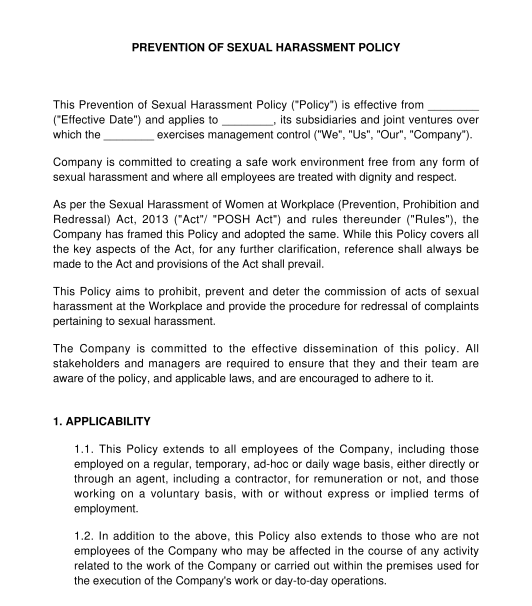 15-09-2025
15-09-2025

Answer a few questions and your document is created automatically.

Your document is ready! You will receive it in Word and PDF formats. You will be able to modify it.

 15-09-2025
15-09-2025
 Word and PDF
Word and PDF
 10 to 15 pages
10 to 15 pages



A POSH Policy is a document used to raise awareness among the employees and other personnel of an organization about the Sexual Harassment of Women at Workplace. The purpose of this Policy is to provide a safe, secure and enabling environment, free from sexual harassment to every woman.
The POSH Policy is applicable to all employees and personnel of the organization. Further, the Policy endeavours to protect its women employees at any place visited by her which arises out of or during the course of her employment with the organization including transportation provided by the organization.
This Policy is a one-sided agreement drafted by the organization in accordance with the law without any negotiation with the employees and employees will have only the option to sign and acknowledge the same.
Yes, every organization in India must have a POSH Policy. Moreover, any organization with more than 10 employees shall constitute an Internal Complaints Committee ("ICC") to deal with sexual harassment complaints at the workplace.
During the pendency of the inquiry, the ICC may recommend to the employer to take necessary steps to give temporary relief to the aggrieved woman by transferring her or the respondent (a person against whom the allegations have been made) to a different workplace or granting leave for a period of three months or other appropriate reliefs as the employer may deem fit to meet the justice.
Harassment under the law means any unwelcome behaviour that is sexually suggestive or explicit Including physical contact, sexual advances, demanding or requesting sexual favours, etc. Any conduct that makes the employee feel uncomfortable, intimidated, or unsafe can be considered harassment under the law.
The POSH Policy remains in effect as long as the organization operates. It should be reviewed and updated to ensure compliance with updates in laws, and industrial standards.
Once the policy is drafted, it can be circulated to the employees through electronic medium or in physical copies. The organization may ask the employees to acknowledge this policy and send it back for record purposes. It is better to incorporate this document in employment agreements and get it signed at the time of joining the organization.
It is always better to make the policy accessible to all employees of the organization and update them whenever there are any changes made to this policy.
This policy can be used by any type of organization despite their size or type of business and can be used as a supplementary document to the Employment Agreement, Employee Code of Conduct Policy, Non-Compete Agreement, Remote Work Policy, Employee Privacy Policy and Employee Handbook.
Yes, a POSH Policy, is a binding document for every employee in the organization. Even if the POSH Policy is not implemented, the rules and regulations under the law will apply to every employee.
The POSH Policy must contain the following clauses:
Definition: This defines what actions will constitute a sexual offence under the law in the workplace.
Internal Complaints Committee ("ICC"): This covers the constitution of ICC, their roles and responsibilities.
Lodging a Complaint: This covers how an aggrieved woman can file a complaint to the ICC, the rules, and the timelines to submit a complaint.
Conciliation: Process of conciliation after filing a complaint.
Enquiry: This covers the enquiry proceedings, rules and timelines to be followed when a complaint is received by the ICC.
Malicious Complaints: Provisions dealing with false complaints filed.
Training Details: Provisions related to awareness and training.
Disciplinary Action: Possible consequences and disciplinary actions for violators.
The POSH Policy is covered under the POSH, Act of 2013, and rules thereunder. Some aggravated forms of sexual harassment are covered under the Bharatiya Nyaya Sanhita, 2023.
You fill out a form. The document is created before your eyes as you respond to the questions.
At the end, you receive it in Word and PDF formats. You can modify it and reuse it.
Guides to help you
Country: India